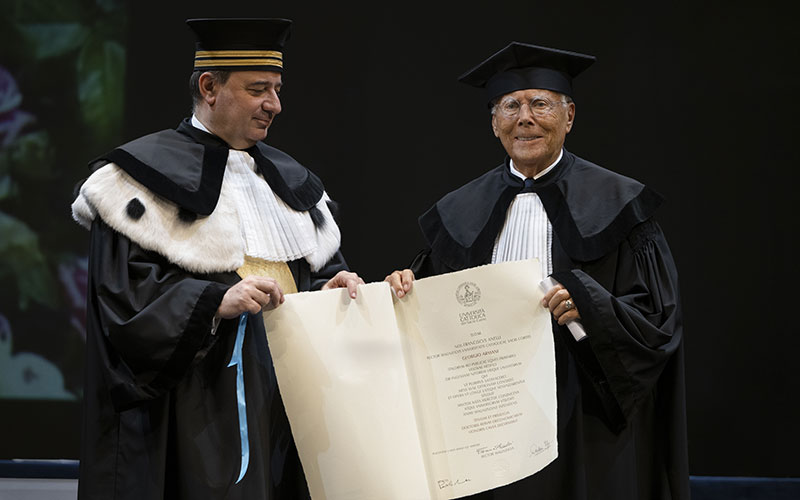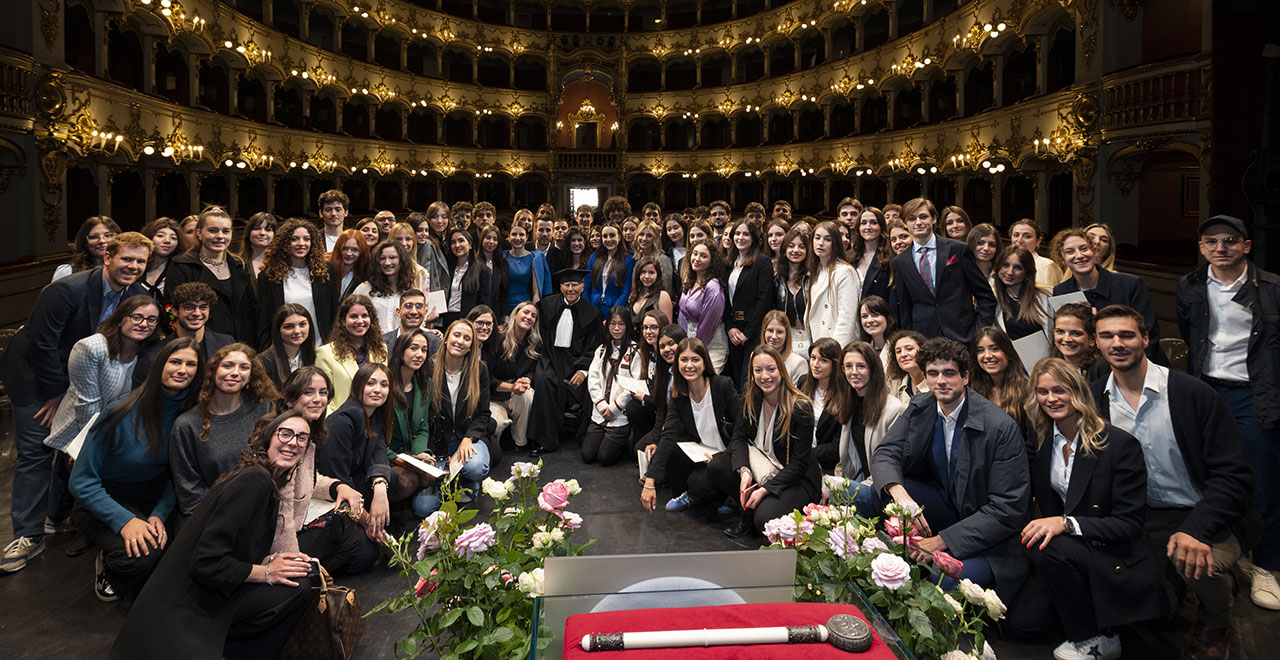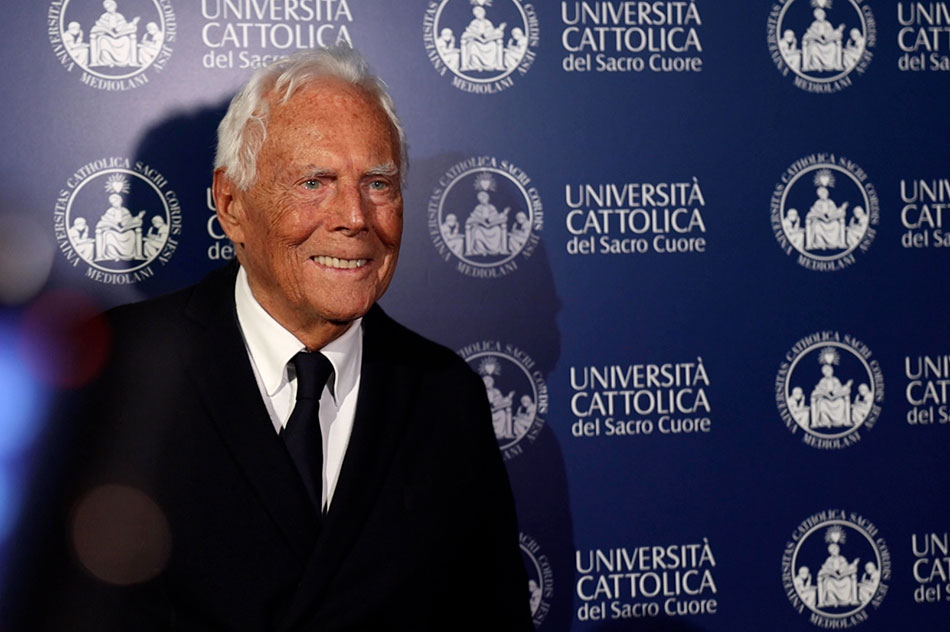
News | Piacenza
Honorary degree to Giorgio Armani, the Rector's speech
| Franco Anelli
12 maggio 2023
Condividi su:

"There are two things that bring me here with great emotion: receiving what you have given me and seeing Piacenza again after so many years. On the stage of the Municipal Theatre in Piacenza, moments after receiving an honorary degree in Global Business Management, Giorgio Armani gives himself with great generosity to the students of Università Cattolica. “I am a rational creative, but the drive always comes from passion. From an intuition and a burning desire to realise it", explains the designer and entrepreneur. “Every idea, after all, is the result of falling in love and this work, which for me is life, is a continuous act of love. I also recommend that you cultivate love for what you do, with respect for those around you”. Armani emphasises “the doubly special value” of the title received from the university, “because it rewards, beyond the creative aspect, my role as an entrepreneur, the commitment and passion that have enabled me to transform a dream into a solid group, a symbol of Made in Italy”, but also because “it is awarded in my hometown, in a magical place that fascinated me so much as a child. I left Piacenza to find my way, which I found in Milan, but my roots have always remained here”.
By


A man of enterprise, creativity and innovation, Armani was capable of an ideal and unprecedented vision, pursued with the determination, perseverance and courage that were indispensable for the realisation of a great project, which led to the establishment of one of the most important multinational groups in the sector. An overall assessment of Giorgio Armani's work, said Professor Franco Anelli, Rector of Università Cattolica, could be drawn up starting “from the assumption, in all its implications, of the problematic dimension of time. Durability, for Armani, is a choice of form and content: classic lines and quality of material speak of a product designed to withstand the wear and tear of a collection with ease. But the novelty of his proposal has to do with his sensitivity and timeliness in interpreting the attitudes, roles and functions of contemporary men and women, without forcing them: 'Be yourself, but at your best'. In this sense, one can speak of Armani's classicism, not as a petitio principii, but as the product of an aesthetic innervated with dynamic tensions in the manner of great classical sculpture; the fruit, born almost instinctively and then pursued consistently, of a mobile and open dialogue with man”.
Born in Piacenza in 1934, Armani “is one of the most illustrious sons of the city, who has honoured its image in the world”, as the Rector underlined. “Since 1975, he has gathered the tradition of Italian know-how, which has its roots in our territory, in the trades and works of artisans and workers in weaving, tailoring, and costume, to reinterpret it and make it a universal iconic reference”, says Anna Maria Fellegara, Dean of the Faculty of Economics and Law, reading the motivations for awarding the degree in Global Business Management “for the international dimension of the brand, for the holistic approach to sustainability, for the relentless search for improvement and for the awareness of the centrality of the company in the creation of shared value”.
“Armani has created a group in the fashion and luxury sector at the top of the world, maintaining the direct link between company and founder and preserving the original matrix on a global scale”, continued Dean Fellegara, who went on to point out that the Italian fashion industry is worth a turnover of around 100 billion, employs 500 thousand people and more than 60 thousand companies. “He has brought to the attention of a sector that is crucial for the economy of our country the multiple implications of its remaining in a fully human dimension: from the promotion of fair treatment of people working in the supply chain, to social dedication; from commitment to the pandemic, to environmental responsibility. The challenge to the consolidated consumerist model, with its whirling rhythms and lack of care for quality and beauty, is its most recent commitment and testifies to the choice of an economic dimension that privileges what lasts over time and that cannot disregard the serious and authentic questioning of the ethical reasons for actions”.
Today, Giorgio Armani is Chairman and CEO of the Armani Group, one of the world's leading fashion and luxury companies with 8,304 employees and nine production plants. The Group designs, manufactures, distributes and directly sells fashion and lifestyle products such as clothing, accessories, eyewear, watches, jewellery, cosmetics, perfumes, furniture and furnishings, and is active in the catering and hotel industry. “The impulse to broaden the gaze from the object to the context has been the root and consequence of the global expansion of the Armani brand, which today defines a 'style' not only in clothing, but in various sectors of what is in a word called lifestyle”, says Rector Anelli. “The eclecticism of the entrepreneurial choices does not contradict, but rather enhances, the humanistic coherence of the inspiration: from the unstructured jacket, the most iconic of Armani's creations, a project for a house, a hotel, an entertainment venue was born out of contiguity, crossing the old passions for cinema and sport and extending to outline a personal interpretation of glamour: 'Behind is my eye and inside is my taste', says Armani. On the horizon, there is the future”.
“With courage and confidence, I have always proudly cultivated my independence”, Armani says. “Mine has been a long and sometimes complex journey, but I have managed to overcome the difficult moments with commitment, dedication and rigour. Values that I assimilated in my family, the same ones that I recommend to follow in order to give shape to what one believes in, even more so today when ephemeral successes are multiplied: because what requires commitment, on the other hand, lasts”. “Armani has been able to follow his star, his desire, what he feels is most authentically in tune with his soul and the talents he knows he possesses”, says Fellegara. According to her, the experience of Giorgio Armani, who left Piacenza “at the crossroads of many potentially viable paths, reminds our young people to be welcoming and enterprising, to experience the university course as a threshold to cross, from which to move in order to get to know the world. It teaches that everyone has the responsibility to discover who they are, and then to be themselves in a simple and serious way. His journey tells us what it means to seek a way from the periphery, whose extraordinary centrality Pope Francis reminds us of today; what it means to have vision, to have constancy, to have courage: gifts that add up to genius and extraordinary talents”.
“Fate put me to the test when Sergio Galeotti, the first person to really believe in my talent, passed away”, Armani says. “With him, in the first ten years we built the foundation. When he passed away, many thought I would not make it, but thanks to my stubbornness, overcoming the ever-present shyness, and the support of those close to me, I managed to keep going. I have spoken about myself, in this speech, thinking especially of you students”, he concludes. “With my story I would like to be an example, an incentive. And remind everyone that real work goes a long way”. It is no coincidence, as the Rector well emphasised, that “the degree being conferred today is not a retrospective celebration, but a stage in a creative journey from which we still expect much”.